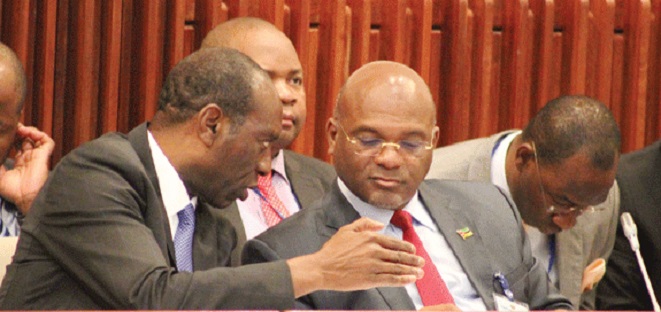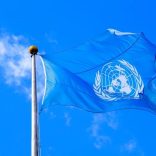Mozambique: Public debt rises 2.7% in Q1
Mozambique “cannot afford general fuel subsidies” – Government tells Parliament

Noticias / Prime Minister Agostinho do Rosário speaks to Minister of Transport and Communications Carlos Mesquita
Mozambican cannot afford to offer general fuel subsidies, benefitting all consumers, both those who can afford to pay higher prices and those who cannot, argued Prime Minister Carlos Agostinho do Rosario on Wednesday.
He was speaking in the country’s parliament, the Assembly of the Republic, answering a question from the parliamentary group of the ruling Frelimo Party about the effect of the fuel price rises imposed by the government on 30 September.
Then the price of diesel rose by 24.5 per cent, from 36.81 to 45.85 meticais per litre (from 48 to 60 US cents, at current exchange rates). Petrol went up by only 5.3 per cent, from 47.52 to 50.02 meticais a litre.
Rosario told the Assembly that raising the price of fuel “is the path the government has found to ensure that the domestic market prices gradually cover the real costs of importing and distributing fuel”.
He pointed out that the last alteration in fuel prices was in 2011. Because the government had kept the prices unchanged “the state had to compensate the fuel companies for the difference between the price of sale to the public and the real import and distribution costs”, a situation made much worse by the sharp devaluation of the metical over the last two years.
Compensating the fuel companies really meant that the government was subsidizing all consumers. This was no longer viable, and Rosario insisted that fuel subsidies must be gradually removed “to reduce the pressure on the state budget”, and release resources that could be used in the education and health services, or to improve water supply.
As for the argument that the government should have reduced fuel prices when international oil prices fell to 30 dollars a barrel, Rosario said that was impossible because in those years the government was trying to pay off an accumulated debt to the fuel companies without dipping into the state budget. Recently, the effect of low international oil prices “has been wiped out by the devaluation of the metical”, he added.
Adding detailed information, Transport Minister Carlos Mesquita pointed out that, despite the September price rise, fuel in Mozambique was still much cheaper than in neighbouring countries. A litre of diesel costs the equivalent of 53.27 meticais in South Africa, 57.75 meticais in Tanzania, 82.27 meticais in Malawi, 74.47 meticais in Zimbabwe and 60.13 meticais in Zambia.
The difference in prices has made it attractive for motorists in eastern Zimbabwe, for example, to cross the border to fill up their cars at Mozambican petrol stations. Mesquita said this encouraged rackets whereby people in neighbouring countries bought fuel in Mozambique in meticais, then resold it in their countries for the much higher local price.
Mesquita added that fares for urban passenger transport are cheap in Mozambique. In Maputo, the flat rate fares are seven or nine meticais, depending on the distance travelled. In Johannesburg the fare for a distance of up to 15 kilometres is the equivalent of 18.75 meticais, in Dar es Salaam it is 12.8 meticais, and in Lusaka it is 18 meticais.
The fare in Maputo and other major Mozambican cities “is less than half what it should be”, said Mesquita, “which contributes to the poor availability and low quality of urban public passenger transport”.
Nonetheless, the government has decided to continue subsidizing the private minibuses (known as “chapas”, that provide much of urban passenger transport). As long as the vehicle is licensed, a chapa owner will only pay 31 meticais for a litre of diesel.
Mesquita noted that this policy dates back to 2008 and has been costing the government around 220 million meticais a year. That figure has been rising – in 2015 the passenger transport fuel subsidy reached 334 million meticais, and this year Mesquita expected the figure to hit 575 million meticais.
The minister pointed out that other modes of transport are also subsidized. The public port and rail company, CFM, carries 4.7 million passengers a year, and its fares are about 20 per cent of the real cost. CFM was thus subsidizing its passengers to the tune of 400 million meticais a year. It was the same story with ferries across the bay of Maputo, and in the cities of Inhambane and Quelimane. Passengers on these ferries enjoy an annual subsidy from the government of 50 million meticais.
“The economy cannot rest on subsidies”, declared Mesquita, “because they generate inefficiencies in the productive process, and because the country does not have the financial capacity to continue compensating the transporters at the required levels”.
Measures must therefore be adopted, he insisted, that will allow a gradual rise in urban passenger transport fares.
Despite this, the government has embarked on measures that will increase transport subsidies. It is working with the Association of Road Transport Operators (FEMATRO) to persuade unlicensed chapa owners to license their vehicles, which will certainly add to the amount the government must pay for the subsidised diesel.












Leave a Reply
Be the First to Comment!
You must be logged in to post a comment.
You must be logged in to post a comment.